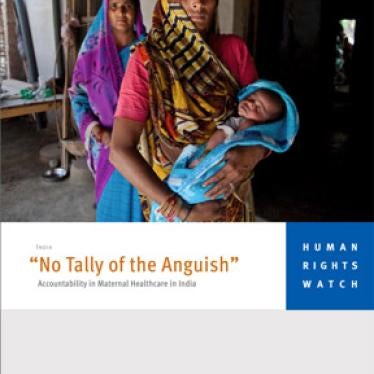Around this time last year a friend sent me a link to the hilarious "Mother of the Year Award" online video from Momsrising.org. I was on maternity leave, and laughed until I cried at the witty lines about mothering. I watched it with my two little boys - my four-year-old had no idea why it was funny, but roared with laughter anyway. I sent it to almost every mom I know.
This year, I'm sharing another online video about motherhood. "In Silence: Maternal Mortality in India" also made me cry, but this time out of horror. It's on maternal deaths in India, where more than 60,000 pregnancies end each year with a mother dying unnecessarily. My organization, Human Rights Watch, produced the video in collaboration with award-winning Magnum photographer Susan Meiselas.
Our video has been nominated for a 2010 Webby Award, considered the Internet's highest honor, in the category of Best Documentary: Individual Episode. We are honored to be nominated, and even more excited at the prospect of raising public awareness of how crucial human rights are to combating maternal deaths.
The video tells the story of Kiran Yadav, a 25-year-old Indian woman who died needlessly while giving birth to her third child, a son. Human Rights Watch interviewed Kiran's family during extensive research on maternal mortality in the Indian state of Uttar Pradesh. Kiran delivered at a rural clinic but began to hemorrhage, and died while her relatives tried to persuade the district hospital to admit her. Her sister-in-law now cares for Kiran's three children while working the peppermint fields.
Our investigation took a close look at what's going wrong in the Uttar Pradesh's health system that allows women like Kiran to die without cause. We found a series of failings that exposed the government's disregard for women's basic human rights. For instance, officials don't even properly count the numbers of women who die because of pregnancy or childbirth. Nor do they respond as they should to families with grievances about the system. The authorities are taking some important steps to improve access to maternal health care but they're not doing enough to avoid repeating the same mistakes.
And it's not about money - or the lack of it. Granted, Uttar Pradesh has massive shortages in health personnel and infrastructure - but the government fails to spend millions of health care dollars each year in Uttar Pradesh; Indian activists say $140 million of the state's health budget went unspent in the fiscal year ending in March 2009.
So we urged the government to free up resources to investigate the causes of maternal deaths, track all pregnancy outcomes, and monitor access to emergency obstetric care. We also recommended the creation of a system for women and their families to register complaints and receive justice, and the development of early response systems, including telephone hotlines for health emergencies. The state should revamp local health care management to avoid perpetuating the fatal mistakes that affect pregnant women. These are core elements of a response to maternal deaths that respects women's human rights to life, health, and non-discrimination.
Sadly maternal mortality is a critical issue far beyond India. According to a study recently released by the medical journal The Lancet, nearly 343,000 women and girls around the world are estimated to have died in 2008 from pregnancy and childbirth, and other sources estimate even higher numbers of deaths each year. While this is actually an improvement on earlier figures, governments could still do much more. Human Rights Watch is urging donor countries, like the United States, and international agencies to provide technical and financial assistance to help governments investigate maternal deaths and combat maternal mortality while also promoting women's human rights.
Check out our video. If you like it, cast your vote to support it in the Webby's People's Voice Award at http://webby.aol.com/entries/49544. Share it with your friends. And support efforts to eliminate preventable maternal deaths. In the words of a woman who watched her pregnant daughter-in-law die at an Indian health facility, "Let this not happen to anyone else."







